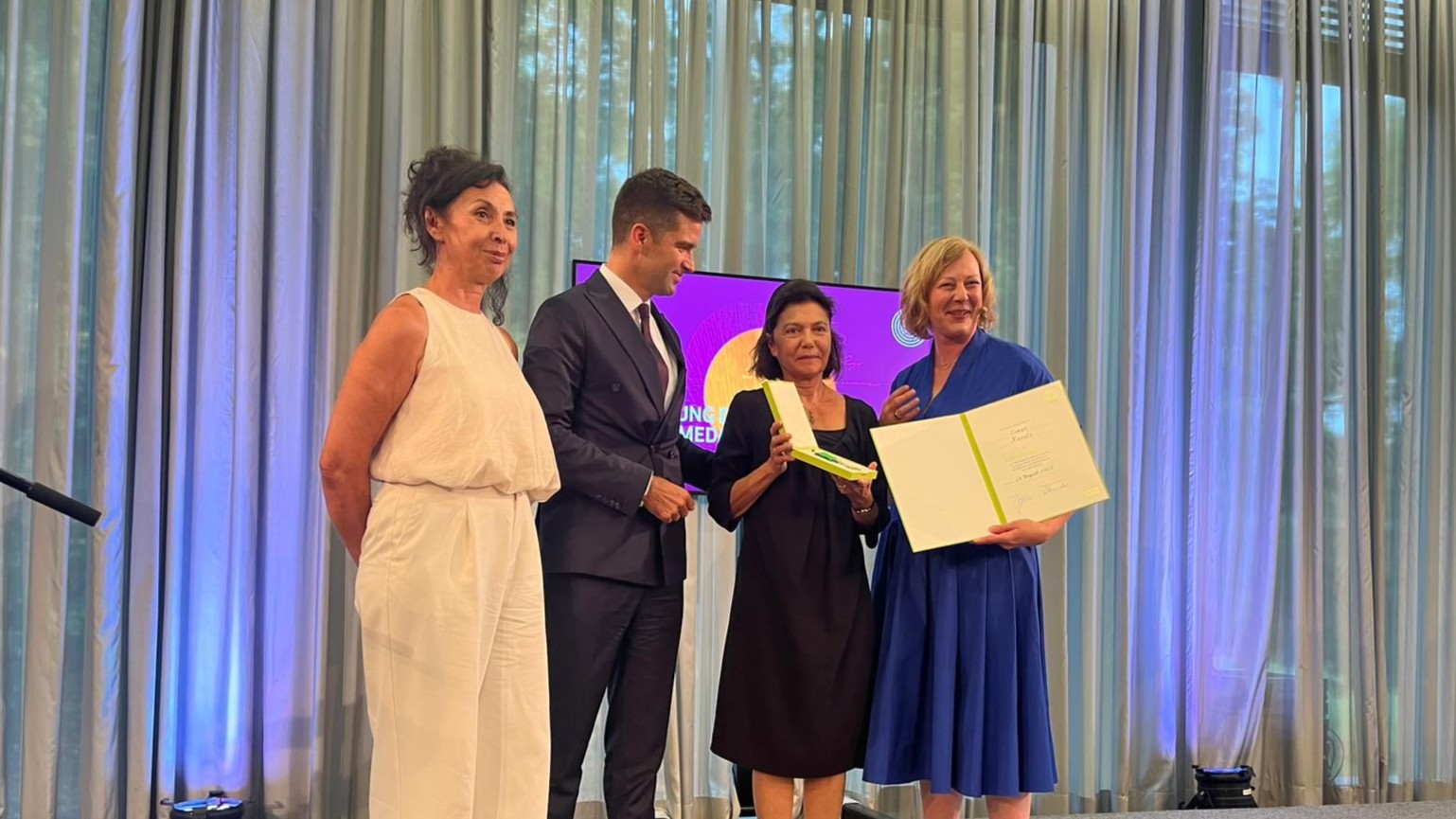The Goethe Medal 2025 Award Ceremony and Osman Kavala’s Acceptance Speech

Osman Kavala was awarded the Goethe Medal, one of Germany's most prestigious state honors, alongside Chinese linguist Li Yuan and Belgian writer David Van Reybrouck. The award is presented to its recipients every year on the birthday of German writer and poet Johann Wolfgang von Goethe. On August 28, 2025, at a ceremony held in Weimar, Goethe's birthplace, Osman Kavala's wife, Prof. Ayşe Buğra, accepted the award on his behalf. Following a presentation by Shermin Langoff, director of the Maxim Gorki Theater, Ayşe Buğra read Osman Kavala's acceptance speech. Below is the text of the speech:
Osman Kavala’s Goethe Medal Acceptance Speech
I am very much honoured to be awarded the Goethe Medal together with two distinguished individuals, Ms. Li Yuan and Mr. David Van Reybrouck. I would like to express my thanks to the jury for including me among this year’s awardees.
The long-standing fruitful cooperation between the Goethe-Institut and my organization, Anadolu Kültür, must have been an important factor in the jury’s decision. Therefore, I would like to share this honour with my colleagues who made important contributions to our joint projects, in particular Asena Günal, who has successfully steered Anadolu Kültür in my absence.
In the face of the haunting problems of today —wars, acts of aggression, migration, and oppressive policies— I believe that it is more important than ever for us to stand up and work for the advent of a genuinely universalist humanism. For those of us who believe that the mental and emotional bridges necessary for the realization of this ideal could be constructed through arts and literature, the writings of Goethe have a very special meaning and relevance in the context of the realities of our times. As you all know, Maestro Barenboim, who received the Goethe Medal in 2007, and Edward Said, when they formed an orchestra bringing together young Jewish and Arab musicians, were inspired by Goethe’s West-Eastern Divan (West-östlicher Divan), a magnificent literary-intellectual bridge between Western and Eastern poetry revealing the shared sensitivities and values of humanity. Anadolu Kültür’s project to organize a Turkish-Armenian youth orchestra, which participated in the Young Euro Classic Festival held in Berlin, was motivated by the meaningful initiatives of Said and Barenboim.
During my stay in prison, I had the chance to read more of Goethe’s work and the inspiring article by Professor Jeremy Adler, “The Genealogy of ‘Human Dignity’” . In this article, Adler discusses Goethe’s contribution to the development of the concept of human dignity, which has become so central to the evolution of the norms and values of humanity inherent in the framing of human rights.
As Adler writes, in parallel with Kant, Goethe introduced a universalist content to this concept by grounding it in the autonomy of the individual. The conceptualization of dignity as a human attribute “that grows, changes and develops in an organic manner in order to achieve its full potential in body and mind” first appeared in Goethe’s writings. In “Wilhelm Meister’s Apprenticeship” (Wilhelm Meister’s Lehrjahre), it is possible to see that for Goethe the existence of a vibrant cultural environment, participation in cultural activity, and the possibility of access to works of art and literature created in societies other than one’s own appear as essential elements contributing to such an “organic self-development”.
Respect for human dignity became a universal norm after the Second World War in light of the Holocaust experience and other collective crimes committed against humanity. The concept served to provide a secure basis for human rights and contributed to their expansion, as human rights have in time come to be understood in terms of the realization of the social, economic, and cultural conditions necessary for the full development of human faculties in harmony with the social environment, an axiom which, as Adler notes, echoes Goethe’s concept of organic self-development in its close association with dignity. In its new content, dignity empowers the individual against the state, adding a moral value to his or her citizenship status.
However, despite the universalization of human dignity and the stipulations asserting its inviolability in domestic laws and international covenants, grave violations of human dignity continue, particularly in war zones and through the practices of political prosecution under anti-democratic regimes. But such assaults from the outside would not necessarily result in destroying an individual’s self-dignity. Even under such conditions, the sense of one’s dignity continues to be empowering and helps the individual to maintain his or her strength to resist oppression and persecution.
I would like to point out the contribution of literature, not only to the conceptualization of dignity, but also, and perhaps more significantly, to the transmission of the feelings and sensibilities that enable the internalization of the concept. This has been my experience in prison. For me, the Goethe Medal will be a symbol evoking and reinforcing all the meanings of human dignity.
Osman Kavala
August 28, 2025
